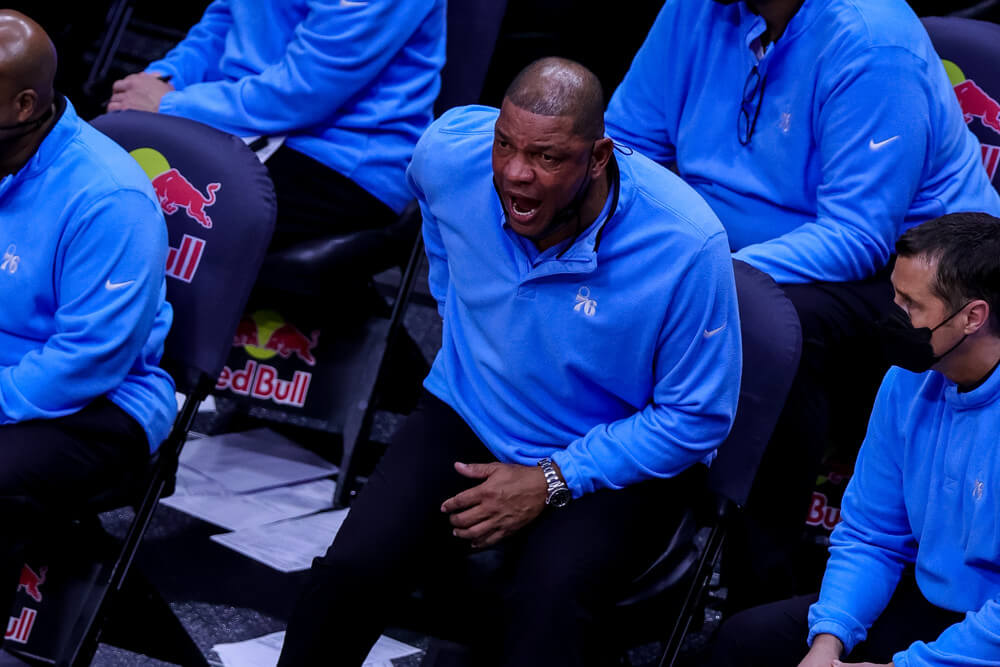With the offseason dust beginning to settle, the realism of simply “running it back” is beginning to set in. The Sixers elected to bring back Danny Green and there still has been no Ben Simmons trade. While a deal may certainly still occur, the clock is ticking and Daryl Morey recently tweeted out some positive stats about last year’s lineup indicating it might be best to expect more of the same. For Doc Rivers, a change of heart is needed.
While Ben Simmons has rightfully been criticized greatly for his postseason performance, he is far from the only problem on the team. Doc Rivers should also be held accountable for a disappointing postseason performance in which he was outcoached by a large margin and failed to put the Sixers in the best position to win. Regardless of what the roster is next season, the Sixers will require a better postseason performance from their head coach if they want to ascend to their title hopes. Here are three specific areas where improvement is essential:
All Bench Lineups
Let me start by saying the quality of the Sixers bench was certainly a part of this issue. There were nights where guys like Dwight Howard, Mike Scott, Shake Milton, and Furkan Korkmaz were simply unplayable given their production on the court forcing Rivers to adjust on the fly. The Sixers preached their satisfaction with the team’s depth throughout the year and did not learn that the lesson that a few great guys are more effective than a lot of good ones.
During the regular season the lineup of Shake Milton, Mike Scott, Matisse Thybulle, Dwight Howard, and Furkan Korkmaz was the lineup that clocked the third-most minutes on the team. This group trailed only the typical starting lineup (Embiid, Harris, Simmons, Green, Curry) and the starters with Mike Scott in place of Embiid for minutes played. While it is possible to get away with this in the regular season, relying on an all-bench lineup in the playoffs is inexcusable.
During the postseason, Rivers was first seen attempting to use the all-bench lineup in the opening series against the Wizards. The lineup of George Hill, Tyrese Maxey, Furkan Korkmaz, Matisse Thybulle, and Dwight Howard played just 11 mins and 25 seconds in the postseason. Per 100 possessions this group was outscored by 27.4 points and attempted 11.7 fewer shot attempts.
To address this issue, Rivers opted to play Tobias Harris with the typical bench lineup. Tobias, Matisse Thybulle, Shake Milton, George Hill, and Dwight Howard clocked the third-most minutes in the postseason of any unit but still struggled to find success. This group was outscored by 11.4 points per 100 possession and played a total of 33 minutes and 52 seconds. When considering the starters outscored opponents by 39.7 points per 100 possessions, cutting the deficit from the second unit would be effective in translating to team success.
While the overall talent of the bench unit is certainly an issue in addressing this, Doc’s stubbornness to rotate in units rather than simply giving guys rest is a real concern. This concern will not go away next season and becoming increasingly an issue next postseason. The decision to not have any of your five best players on the court when the season is on the line is one that should simply never be made.
Feel on the Game
Doc Rivers spent 12 years in the NBA as a player where he was a one-time all-star and averaged 10.9 points, 5.7 assists, and 3 rebounds. He has also coached for 22 seasons and received the honors of Coach of the Year (99-2000) and won a championship with the Boston Celtics. There should be 0 questions about the basketball IQ of Doc Rivers, but for a guy who has been around basketball so long- it is concerning his feel for the game.
There is a lot to like from Doc Rivers in year one with the Sixers. He commanded the respect of the locker room, made a positive impact on the team culture, and led the team to the top spot in the East. Rivers steered Joel Embiid to a career year and a legitimate MVP candidacy.
While the regular season accomplishments were great, Rivers’ flaws were put on display in the postseason. Scott Brooks managed to lead the Wizards to a game four upset victory where he effectively put the Sixers’ weaknesses on display. In the Hawks series, Lloyd Pierce made several adjustments that Doc Rivers simply did not have a counter for and the Sixers fell in a series they were expected to breeze through.
During postseason basketball, every split decision carries more weight. As a coach, it is so important to have your pulse on the feel of the game. Making the decision to pull the plug on a lineup or make an adjustment on the fly can make or break games and Rivers has failed in this area. For example, look at how Steve Nash played Kevin Durant a full 48 minutes in order to win game five of the Eastern Conference Finals over the Milwaukee Bucks. While this did not work out in the long run for the Nets, Nash put the team in the best position to win in a way that Rivers did not show flexibility this year.
Protecting Joel Embiid
For as long as he continues to play, Joel Embiid is the Sixers’ number one opportunity. This was reinforced recently as the Sixers agreed to a super-max deal that will keep him in Philly until the 2026-27 season. While load management is tossed around too easily in today’s NBA, Embiid has earned every right to these nights off. Protecting him and making sure his body can play for as long as possible must be at the top of the Sixers priority list in order to make the most of his career.
While Embiid himself hates the prospect of not playing in every possible game, it is the Sixers’ responsibility to protect him. “The Process” himself played in seven different sets of back-to-back games last season which is unacceptable when considering his injury history. While it would be great for him to be able to be out there every game, this is simply not the case for Joel Embiid. The Sixers must consider how to get the most out of his career when making these types of decisions and that is far too much risk to put on the franchise centerpiece.
When discussing the concept of the load management tactics that surround Embiid, Doc Rivers brought up what he referred to as “old-school load management.” By this, Rivers meant that the Sixers would get Embiid out of the game as soon as possible when a significant lead is built. This is great in principle but much more difficult in practice as games do not always according to the script, and the Sixers certainly proved that this season. There were also many games throughout the season where Embiid remained in the game far longer than he needed to be- which is infuriating.
The Sixers must have an effective plan in place for protecting Embiid this season if they are to hope for long-term success. While some of this can be attributed to the newly placed Covid protocols, Joel Embiid’s status was uncertain for just about every game. There were countless games last season where Doc Rivers sat at the pregame media sessions and did not have a true answer for whether or not Embiid would be active for the game that would be tipping off in an hour and a half. This certainly doesn’t fall entirely on the shoulders of Rivers, but leading the charge in protecting his superstar must become a larger priority for Doc.
Given the sour ending to the Sixers season, no one should be immune from a reevaluation. The 6’10 Australian elephant in the room has soaked up most of the criticism but, Doc Rivers also needs to improve on his performance last season. With that being said, the Sixers could have far worse options to head the team than Doc Rivers. Last season had unique obstacles that no coach could have ever prepared for. With a full offseason and a more normal training camp ahead, the story certainly could be different with Rivers this season. Whether he is the right guy for the job is still to be determined, but there is certainly room for Doc to grow heading into year two.
Photo by Stephen Lew/Icon Sportswire




























